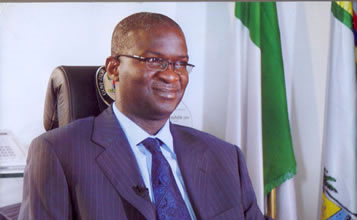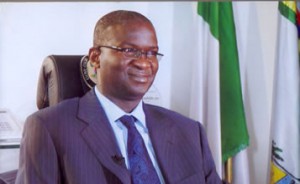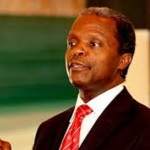Fashola Says Nigeria Has Fallen Like Humpty Dumpty
Ayo Balogun, Featured, Latest Headlines, News Friday, December 27th, 2013
Ayo Balogun, Lagos
Governor Babatunde Fashola of Lagos State has lamented that Nigeria has fallen from grace to grass like Humpty Dumpty and needs urgent reconstruction.
The governor, who spoke at both the Yoruba Tennis Club and the Island Club in Central Lagos, Southwest Nigeria, said it is a moderation of the current realities to say that “Nigeria has become dysfunctional as a nation because not only has her ego been bruised and her national pride brittle where it even exists, many nations who either once looked to her for assistance or leadership will rather now seek not to be openly associated with Nigeria.”
“As if that was not bad enough, those who dared not look us in the face at one time are no longer restrained in making scurrilous statements about us. Ladies and gentlemen, we seem to have fallen, like Humpty Dumpty, from an Olympian Height. Indeed like Humpty Dumpty, we are blessed with great men and women. However, unlike Humpty Dumpty, I believe we can put Nigeria together again in a manner of speaking”, he stated.
He, however, noted that putting Nigeria together again would not happen simply by saying so “which is indeed a starting point and a good one that indicates the people’s resolve,” adding that it would also require everyone to unite their minds so that action could also be united.
“That resolve, I beg to argue, will come if only we can believe again. Yes, I use the word again because the past is relevant here. We must remember how great we once were. We must remember what makes us great. We must accept and not pretend about our currents status, that we have tripped and fallen. We must resolve, because we believe that we will get up and climb our way back to the top.
“Let me remind those who are old enough to remember, and they seem quite many here tonight, and inform those who are too young to know, for it is they who have the largest stake in this future, that our period of greatness was not free of trouble. There was crime. There were labour strikes. There were political struggles; there was disease and in the midst of our prosperity there was still a cash crunch, but amidst all of these there was the elixir of hope and a promise of a better life on the horizon,” he explained.
Fashola said the only difference between Nigeria’s yesterday and her today, was that yesterday’s hope had given way to today’s uncertainty and despair and that the only reason seemed to be the choices that had been made and by the values pursued.
He reiterated that it was the people who had changed and not the country, its resources or its promise because while her population had become bigger, her productivity had certainly diminished, adding: “This has happened because the population of today was not of the same quality as the population of yesterday.”
According to him, “we must accept that we are the problem and not any government or any Constitution. We must resolve each and every one of us from tonight, to say ‘no’ to all of those things and to do so for one purpose – because we believe again. What are those things we must do less of? They are a long list that seem to vary daily, but which some of us undertake, and for which all of us pay.”
He buttressed his point with examples of the way Nigerians drive, adding that unlike in days gone by, when it was a near impossibility to see anyone driving without having undergone two sets of driving test or even see people driving vehicles without affixed number plates, these days, it had become the fad for people to drive against traffic at the flimsiest opportunity or even deliberately slow down traffic while shopping in such a traffic.
He said even in terms of buildings, many Nigerians now resort to building without statutory permits with no inputs from professionals in the built industry as well as usage of sub-standard materials, no concern for maintenance and no respect for the right of others.
Among other examples, the governor also spoke about the way Nigerians worship, saying mosques and churches dot every nooks and crannies in residential areas, bringing about noise, sleeplessness, diminished quality of life, traffic to get in and out, over-stretching the neighbourhood infrastructure and converting work places to worship places which is another word for substitution of production for praying while still expecting young people to find work by praying.
Related Posts
Short URL: https://www.africanexaminer.com/?p=6504
























BRF the man of the moment, I salute your courage and dept of your leadership, keep it up sir. Kudos to Asiwaju for giving you to us. Eko o no bake oo!